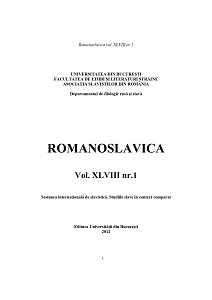Originea numelor feminine sârbeşti şi româneşti din perspectivă semantică
The origin of Serbian and Romanian feminine names from a semantic perspective
Author(s): Anca-Maria BercaruSubject(s): Semantics, Historical Linguistics, Comparative Linguistics, South Slavic Languages, Philology
Published by: Editura Universităţii din Bucureşti
Keywords: feminine anthroponyms; semantic meaning; Serbian; Romanian; common words; historical onomastics;
Summary/Abstract: In this paper we submit to analysis the system of Romanian and Serbian feminine anthroponyms from a semantic perspective. The biggest controversies regarding this matter arise from the aspects that refer to the etymology of personal names from the point of view of the common name – anthroponym relation (nomina appelativa – nomina propria). Two main issues emerge from this relation: 1.1. Do proper names have semantic meaning? 1.2. When we analyse them should we search for the common word that led to the formation of the respective anthroponym which gives semantic meaning to the proper name? We have two possible situations in both languages: a) the calendar names (such as the Romanian name Alexandra and the Serbian Aleksandra or the Serbian and Romanian name Ana) and the modern names (such as Adela which exists in both languages) do not maintain in their form the meaning of the common words they were created from. b) the traditional names such as the Serbian Lepotica, Ljubičica, Malica and the Romanian Crenguţa, Floarea, Lăcrămioara retain in their form the meanings of the common names that led to their formation through the process of conversion. In both cases the functionality of the common name – anthroponym relation such as it appears in the case of common names is modified. In the first case it is total: the semantic relation between the former common words and the anthroponyms created from them disappears completely; in the second case it is partial: the acoustic form of the personal name maintains the relation with the common name, but the content is not the same anymore, the designatum is a woman with qualities and profession. The second issue is important mostly for the study of historical onomastics which, among others, aims at understanding the motives and circumstances in which certain anthroponyms were created. The Serbian system of names contains a category of feminine and masculine names which exercised in the past the function of protecting the child from the bad influence of the supernatural forces. The protective function in the case of the prophylactic names is realised through the acoustic form of the respective name that has the role of keeping the evil spirits away. This category contains names such as: Grdana (Novaković 57, Miklosich 54) < masculine name Grdan < adjective grdan “huge, immense, enormous”; Gromna (Novaković 56) < noun grom “thunder”; Gruba (Miklosich 55), Grubača (Stojanović III 315), Grubana (Novaković 57) < adjective gruba “rude, coarse, indelicate”.
Journal: Romanoslavica
- Issue Year: XLVIII/2012
- Issue No: 1
- Page Range: 5-13
- Page Count: 9
- Language: Romanian

